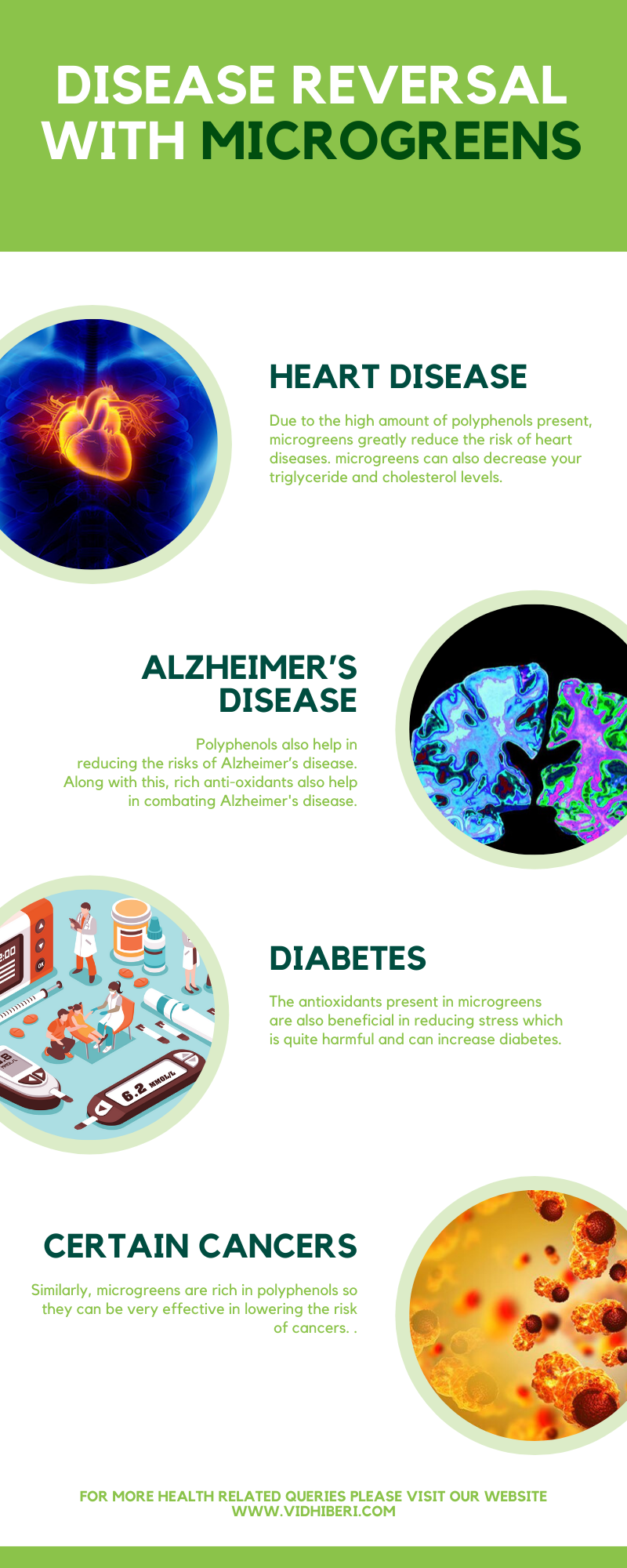Introduced to the Californian restaurant scene in the 1980s, the popularity of microgreens has increased tenfold. Also known as micro herbs or vegetable confetti, these aromatic greens are flavourful and add colour to dishes. They may be small in size, but they add a great amount of nutritional value to your diet and quite often they come with higher nutrient levels than the mature green vegetables. This shows why exactly are microgreens considered a great addition to your daily diet. In this article, we are going to take you through the types of microgreens and also their several health benefits.

Basically microgreens are young vegetable greens. These aromatic flavored greens are about 1-3 inches tall and come in a variety of colours. Microgreens are baby plants and come in between sprout and baby green. Sometimes microgreens are confused with sprouts but it is not the case since sprouts take 2-7 days to grow, while microgreens take around 7-21 days after germination. They are quite easy to grow and can be grown outdoors, greenhouses and even on windowsills. Microgreens are quite similar to baby greens because of their edible stems and leaves although microgreens are far smaller in size and can be sold off even before they are harvested.
You can grow microgreens from a wide variety of seeds. Let’s take a look at the plant families whose seeds are used to produce the most popular varieties of microgreens:
1. Lamiaceae family: Mint, basil, rosemary, sage, and oregano.
2. Poaceae family: barley, corn, rice, oats, wheatgrass, beans, chickpeas, and lentils.
3. Brassicaceae family: Cauliflower, broccoli, cabbage, watercress, radish, and arugula.
4. Asteraceae family: Lettuce, endive, chicory, and radicchio.
4. Apiaceae family: Dill, carrot, celery, and fennel.
5. Amaryllidaceae family: Garlic, onion, leek.
6. Amaranthaceae family: Amaranth, quinoa swiss chard, beet and spinach.
7. Cucurbitaceae family: Melon, cucumber, and squash.
Different varieties of microgreens have different tastes which range from spicy to sour or even bitter. Their flavor is quite strong.
Well, we all know that eating vegetables reduces the risk of a lot of diseases. Simply because they are equipped with several vitamins, minerals, and beneficial plant compounds. Microgreens are no different as they are packed with a similar or even greater amount of these beneficial nutrients. So, they are also as useful as green vegetables in reducing the risk of these diseases:
Heart Disease: Due to the high amount of polyphenols present, microgreens greatly reduce the risk of heart diseases. Polyphenols are antioxidants that are quite useful in heart diseases. According to animal studies, microgreens can also decrease your triglyceride and cholesterol levels.
Alzheimer’s Disease: Polyphenols also help in reducing the risks of Alzheimer’s disease. Microgreens are rich in antioxidants and contain high amounts of polyphenols as we discussed in the above paragraph.
Diabetes: The antioxidants present in microgreens are also beneficial in reducing stress which is quite harmful and can increase diabetes. By reducing the stress, microgreens can prevent the sugar from properly entering the body cells. Fenugreek is quite effective as it increases the cellular sugar uptake by 25-44 percent.
Certain Cancers: Fruits and vegetables rich in antioxidants, especially polyphenols can lower the risk of different types of cancer. Similarly, microgreens are rich in polyphenols so they can be very effective in lowering the risk of cancer.
Even though there are chances of microgreens helping in lowering the risk of the above-mentioned diseases, one should also note that the number of studies that directly measured the effect of microgreens on these medical conditions, is quite limited and none of them were on humans.Microgreens are quite rich in flavour and can be integrated into your diet quite easily in various ways. They are rich in nutrients and can be really effective in reducing the risks of some diseases. The best part about microgreens is that you can grow them at home without a fuss and they are quite cheap and augment your nutrient-intake. All in all, microgreens are quite a worthy and useful addition to your daily diet.
If you want to know more about mind and body wellness you can always consult an efficient health. A health coach can guide you effectively by outlining necessary tips. Vidhi Beri, a certified Holistic Health Coach in Kolkata, and Consultant can help you with her innovative ideas and approach towards your cause. Suggestive measures of the health educator do work in mapping out health-based programmes. One can rightly choose quality advice and can gain impactful results. It can be highly beneficial to connect with the health and wellness consultant. To know more book appointments with her.